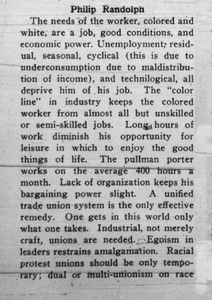Important Speakers Discuss Negro Status (Continued from last week)
Dublin Core
Title
Important Speakers Discuss Negro Status (Continued from last week)
Subject
Bryn Mawr College; 1931 Economic Status of the Negroes Conference; Alain Locke; Alice Dunbar Nelson, Philip Randolph; J.B. Matthews; W.E.B. Du Bois
Description
Continuation of the last week's news article of the speakers who attended the 1931 conference and each of their main talking points. This article provides summarizes the points of Alain Locke, Alice Dunbar Nelson, Philip Randolph, J.B. Matthews, and W.E.B. Du Bois
Source
The College News 1931-05-06 Vol. 17 No. 21
Publisher
Bryn Mawr College
Date
1931-05-06
Contributor
This item has been edited from its original form for clarity by the '24 '31 Students Study Race team.
Rights
Item courtesy Bryn Mawr College Special Collections
Language
English
Type
Text
Identifier
index.cpd
Coverage
Bryn Mawr, PA
1931
1931
Text Item Type Metadata
Text
Important Speakers Discuss Negro Status
(Continued from last week)
Mr. Locke
The migrations of the Negro in the last fifteen years have been the impetus for his new cultural development. The Negro has always been the most painfully self-conscious element in American society. This self-consciousness was expressed in many forms during the latter half of the anti-slavery movement. Reconstruction, however, brought social throttling. The intelligent Negro of the Nineties was depressed and resentful, bitter and cynical. In the decade of about 1915-1925, the poems of Claude McKay, Fenton Johnston and others led to a change in Negro morale. A new proud, hopeful self-consciousness was initiated. It has led to significant contributions to American art by Negroes. Twenty or thirty years from now it will be felt in religious, economic and political development, the result of the race patriotism it is engendering. Negro business functions on the basis of race loyalty.
The Negro’s lack of prestige has resulted from his positions as an exploited laborer and from the fact that he has been thought of as a man without a culture. The latter fact is becoming untrue. The value of Negro art has long been recognized in liberal journals. Whether it will filter down to the masses is a question. One must remember, however, that Negro art like all art is best when it is beyond category, when it is universal. With cultural and economic equality will come social justice.
Alice Dunbar Nelson
The subject of Mrs. Nelson's talk was the Negro Woman Worker in Industry: Present conditions of Negro women labor are acute. If the Negro man is the last hired and first fired, the Negro woman's position is even below that of the Negro man. In 1929 a United States labor bulletin covering fifteen States was published on the subject of Negro woman labor. It showed the presence of women workers in dirty, dangerous jobs, under poor supervision, poorly paid, working long hours under strain. The medium wage is $9 a week in most States, $6 in four States. The highest medium wage was in the meat packing trade; a $19.50 wage followed the award of the Labor Dispute Arbitration Board. A not unusual wage is the weekly $5.05 medium paid tobacco packers in Arkansas. Piece work pays slightly better than time work but at the cost of much nervous strain. Hours are long, from forty-four hours a week in New Jersey, to sixty hours a week in Alabama.An overwhelming majority of colored women workers are married or have been married. The majority are under 30 years, 13 per cent. are under 20, 1.5 per cent. are 60 years or over. People complain of a high labor turnover of colored women. The 1929 study showed that only 21.5 per cent. stay in one position less than a year; 28.4 per cent. stay in one position for five years or longer.
A few colored women are pioneers in the field of skilled work. They must be more reliable and skillful than white women to succeed.
The loss of jobs by Negro men in the present depression has laid the women open to further exploitation because of their great need for jobs. Overwork on the part of Negro women has as its most serious aspects its effect on the next generation.
Philip Randolph
The needs of the worker, colored and white, are a job, good conditions, and economic power. Unemployment, residual, seasonal, cyclical (this is due to underconsumption due to maldistribution of income), and technilogical [sic], all deprive him of his job. The "color line" in industry keeps the colored worker from almost all but unskilled or semi-skilled jobs. Long hours of work diminish his opportunity for leisure in which to enjoy the good things of life. The pullman porter works on the average 400 hours a month. Lack of organization keeps his bargaining power slight. A unified trade union system is the only effective remedy. One gets in this world only what one takes. Industrial, not merely craft, unions are needed. Egoism in leaders restrains amalgamation. Racial protest unions should be only temporary; dual or multi-unionism on race lines can only weaken the labor movement.There is a crying need at present for education of workers, white and black, in economics. Through institutions like Brookwood Labor College and the Rand School of Social Science and through popular adult education the workings of industry and the evolution of society must be taught.
The healthiest unions are those organized like the Pullman Porters, by and for their members. Unrecognized by the company though it be, it is stronger than the company-imposed union of conductors. lt is a member of the Federation of Labor.
Political action through an American labor party should supplement union action.
Mr. Mathews [sic]
The dominat!on of the colored peoples by the white the capitalist class is no less arrogant for being disguised under such phrases as “the white man’s burden.” It must end. Whether the end will come as the result of cataclysmic events or an evolutionary growth is a question. Many doubt a peaceful solution especially in view of such tendencies in the solution of the problem as were shown at the National Student Faculty Conference at Detroit last Christmas.The issue of the conference was the segregation of Negroes by a hotel, involving a breach of contract. After must [sic] debate segregation was overwhelmingly accepted.
An almost universal tendency of the whites was a refusal to think for themselves and a dependence on the opinions of the Negroes. It would have sufficed for them to have consulted human decency.
Another tendency was toward a "sterile objectivity," the "scientific method.” By this method one makes no decision until all the "facts" are collected, in other words, never. It is necessary to analyze certainly, but equally necessary to stop analysis and act.
A third tendency was toward dismissing all those opposing segregation as a radical fringe. Rather they are the sound core that make for social progress. We need a militant spirit opposing segregation or at least toleration of opposition.
There is a great possibility that the race problem will lead to violence on a large scale. Russia is intensely interested in American race relations. Revolution may come from Moscow. We have not unlimited time to deal with the problem. We must arrive at a constructive solution of the problem in order that the choice be not left to those less qualified to do it.
Dr. DuBois [sic]
The American has a tendency to slur over problems and then leave them. Slavery did not end with emancipation but agitation against it did.The question is often asked, “What do you Negroes expect to get?” Are Negroes to be absorbed or emigrate or exist in America as a separate race?
Whatever happens the problem of what it is to be the American attitude toward colored peoples will not be settled, only shifted, perhaps, to other parts of the world.
The American attitude toward the race problem is a pessimistic one; the colored attitude is not. Colored peoples know that eventually they will triumph from sheer force of numbers. Believers in a just God, believers in fair play (and not in loaded dice) cannot believe in continued white domination.
The real problem of the future is how readjustment is to be brought about with least cost. Most colored people do not ask wealth, luxury, power and privilege, the prerogatives of the white upper class. They do not ask the right to self-respect and to some leisure in which to enjoy culture. Lower class whites are asking the same things. There is a danger that these laboring classes may some day not be stupid enough to ignore their similarity of interest. Negroes are fighting their way into trade unions because their similarity of skill cannot be ignored.
Russia's attempt at socialization of wealth according to needs and deserts is one of the most tremendous things in the world today. If the revolution succeeds, it will sweep over the world. Even if it fail [sic] it will be remembered as a great example of the use of force to favor the proletariat.
It is not only in time of depression that the majority of the world is under tribute to the minority. In the best of times Fifth Avenue shops sell merchandise at fabulous prices while dark-skinned colonials work for twenty cents a day. Capitalists today are bringing monopoly, privilege, prostitution and disfranchisement to the South and being applauded for it. Disfranchisement in the South today disturbs no one; colleges all agree that the ignorant should not vote. There is little hope of any but capitalist economics being taught in universities heavily endowed by capitalists. Work schools like Tuskegee are no better.
As a defense against exploitation the black races can develop race pride. They have much to be proud of in culture, manners, religion and education. Race pride leads to warfare. The colored problem of America could be settled by the annihilation of the colored race but not so the colored problem of the world. We must remember how cordially the United State is despised by Europe and Asia.
Another defense is that of the Association for the Advancement of Colored People. It goes about stirring up people and pressing demands and rights instead of gratefully accepting small favors. Such a program is not popular. Social justice cannot be procured without cost to capitalists. President Hoover does not give speeches to the association when it meets. Colleges like Bryn Mawr, "institutions for handing down every mistake that the older generation has made," once and awhile as a concession to radicals allow students to think for themselves. Members of the faculty, however, must behave or lose their jobs. Radical students may not be expelled but they are not popular. In our white colleges race problems are settled with a few choice words to the fact that colored people are probably dying out anyway but in any case the powerful class will remain so.
There is a chance for magnificent sacrifice in the cause of racial equality, one of the finest causes the world has ever seen.
Original Format
Paper
Files
Reference
1931, Important Speakers Discuss Negro Status (Continued from last week), Bryn Mawr College






